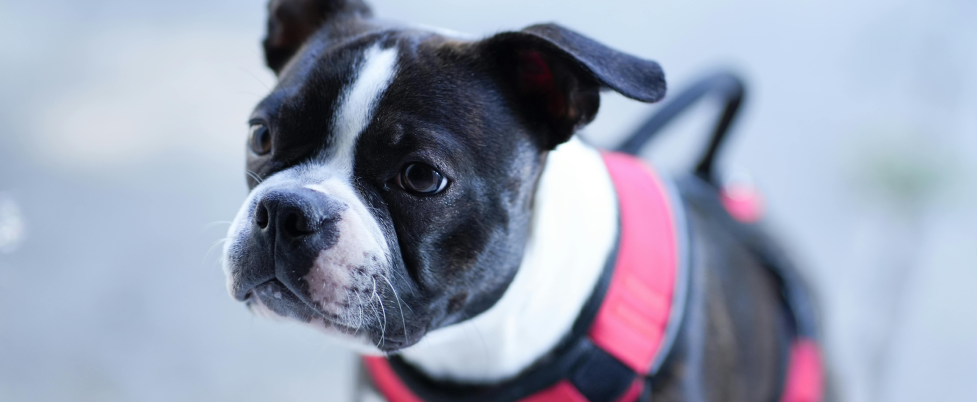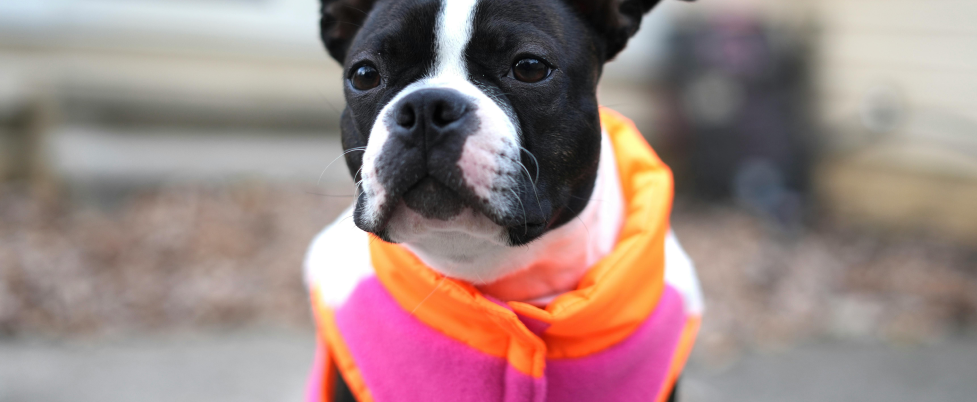LIFE STAGES OF A BOSTON TERRIER / ADULT LIFE

Disclaimer: I am not a veterinarian or professional dog trainer. Always consult professionals for advice tailored to your dog’s specific needs.
Introduction
Caring for your adult Boston Terrier involves maintaining their physical health, mental well-being, and overall happiness. These lovable dogs thrive with proper attention, nutrition, and stimulation. Below is a comprehensive guide to keeping your Boston fit and happy as they navigate adulthood.
Table of Contents
- Overview of Adult Boston Terrier Needs
- Nutrition for Adult Bostons
- Exercise Requirements
- Mental Stimulation and Enrichment
- Grooming Tips for a Healthy Coat
- Dental Care for Lifelong Smiles
- Health Monitoring and Vet Visits
- Managing Common Behavioral Issues
- Tips for Building a Strong Bond
1. Overview of Adult Boston Terrier Needs
Boston Terriers are affectionate, intelligent, and playful companions. As they mature, their care requirements shift slightly from puppyhood, but they still need consistent exercise, mental stimulation, and proper nutrition to stay happy and healthy.
Physical & Mental Characteristics
✔ Weight: Adult Boston Terriers typically weigh between 12–25 pounds, depending on genetics, diet, and exercise. Keeping them within a healthy weight range prevents obesity-related issues.
✔ Energy Level: These dogs have a moderate to high energy level and love to play, go on walks, and engage in interactive activities. While they enjoy bursts of activity, they also appreciate cuddling and relaxing with their owners.
✔ Intelligence: Boston Terriers are highly intelligent and eager to please, making them quick learners. However, their smart, sometimes stubborn nature means they require regular mental challenges like puzzle toys, training games, or new tricks to stay engaged.
Understanding these traits will help you create a lifestyle and care routine that meets your Boston Terrier’s needs as they transition into adulthood.
2. Nutrition for Adult Bostons
A well-balanced diet is crucial to keeping your Boston Terrier healthy, active, and at an ideal weight. Because they are a small breed with a compact body, proper nutrition helps prevent obesity and supports their breathing, digestion, and skin health.
Balanced Diet
- High-Quality Ingredients: Choose premium dog food with lean protein (chicken, fish, or turkey), healthy fats, and wholesome grains or vegetables for energy.
- Small Breed Kibble: Look for small-bite kibble designed for compact mouths to aid chewing and digestion.
- Weight Management: Boston Terriers are prone to weight gain, which can worsen breathing issues. A high-protein diet with controlled fat levels helps maintain a healthy weight.
- Limited-Ingredient Options: Some Bostons have food sensitivities, leading to itchy skin, allergies, or digestive problems. Limited-ingredient formulas can help reduce these risks.
- Avoid Fillers & Additives: Stay away from artificial preservatives, fillers like corn and soy, and overly processed foods that can cause weight gain and allergies.
Feeding Schedule
Two Meals Per Day – Adult Boston Terriers thrive on a consistent feeding schedule, with two balanced meals daily to maintain steady energy and prevent overeating.
Portion Control
Adjust Based on Activity Level & Weight – The amount of food should match your dog’s exercise routine, metabolism, and age. Follow feeding guidelines from your vet or dog food packaging, adjusting as needed.
Supplements
Vet-Recommended Support – Talk to your vet about adding:
- Glucosamine & Chondroitin – Supports joint health, especially as your Boston ages.
- Omega-3 Fatty Acids – Promotes a healthy coat, skin, and brain function.
- Probiotics – Helps with digestive health and prevents bloating or stomach issues.
Providing the right nutrition and portion control will help your Boston Terrier stay fit, active, and happy throughout adulthood.
3. Exercise Requirements
Boston Terriers are energetic and playful, requiring regular exercise to stay healthy and prevent boredom. A well-balanced routine helps maintain their weight, muscle tone, and mental stimulation while preventing destructive behaviors caused by excess energy.
Daily Physical Activity
- Recommended Duration: Aim for 30–60 minutes of physical activity each day. This can be broken into two or three shorter sessions to accommodate their energy levels.
- Walking Essentials: Use a sturdy, well-fitted harness instead of a collar to reduce pressure on their sensitive throats and avoid breathing difficulties due to their brachycephalic (short-snouted) nature.
Fun Activities
- Fetch: A great way to burn energy and strengthen their recall skills.
- Agility Courses: Set up small obstacles to challenge their intelligence and coordination.
- Tug-of-War: Encourages healthy play while reinforcing bite control and muscle strength.
- Swimming (With Supervision): While not all Boston Terriers enjoy water, some can benefit from low-impact swimming to exercise without putting strain on their joints.
Tips for Safe Exercise
- Avoid Overexertion: Boston Terriers can overheat easily, so limit intense activity in hot or humid weather.
- Watch for Breathing Issues: Due to their short noses, they may need breaks between activities to catch their breath.
By keeping their exercise routine fun, varied, and safe, you’ll ensure your Boston Terrier stays fit, happy, and mentally stimulated throughout adulthood.
4. Mental Stimulation and Enrichment
Boston Terriers are highly intelligent and thrive when given regular mental challenges. Without proper stimulation, they can become bored, leading to destructive behaviors such as excessive barking, chewing, or digging. Keeping their minds engaged is just as important as physical exercise to ensure a happy and well-balanced Boston Terrier.
Why Mental Stimulation Is Important
- 🧠 Prevents boredom-related issues such as anxiety and destructive habits.
- 🐕 Encourages problem-solving skills, keeping their minds sharp and engaged.
- 🤝 Strengthens your bond by providing interactive learning experiences.
Ideas for Mental Enrichment
- Puzzle Toys: Toys that dispense treats when solved help challenge their intelligence and keep them occupied.
- Interactive Games: Try hide-and-seek by hiding treats or toys around the house to encourage their sense of smell and exploration.
- Training Sessions: Even in adulthood, Boston Terriers enjoy learning new tricks. Short training sessions reinforce obedience and provide a mental workout.
- Rotate Toys: Introducing new textures, shapes, and squeaky toys keeps playtime exciting and unpredictable.
- Scent Work: Scatter treats around the house or yard and let them sniff them out, tapping into their natural curiosity.
By incorporating enrichment activities into their daily routine, your Boston Terrier will stay mentally sharp, emotionally fulfilled, and less likely to develop behavioral issues.
5. Grooming Tips for a Healthy Coat
Proper grooming keeps your Boston Terrier looking great and helps prevent skin and health issues. Their short coat is low-maintenance, but regular care ensures they stay comfortable and healthy.
Bathing
- Frequency: Bathe your Boston Terrier every 4–6 weeks or as needed, especially if they get dirty.
- Shampoo Choice: Use a gentle, dog-safe shampoo to prevent skin irritation. Hypoallergenic or oatmeal-based formulas work well for sensitive skin.
- Drying Tips: Since Boston Terriers can get cold easily, use a towel or low-heat blow dryer to dry them thoroughly after baths.
Brushing
- Weekly Brushing: Helps remove loose fur, distribute natural oils, and keep their coat smooth and shiny.
- Best Brush Type: A soft-bristle brush or grooming mitt works well for their short coat.
- Shedding Control: While they are not heavy shedders, brushing helps minimize seasonal shedding.
Nail and Ear Care
- Nail Trimming: Trim nails every 2–3 weeks to prevent discomfort and potential injuries from overgrowth.
- Ear Cleaning: Clean ears regularly with a vet-approved solution to prevent wax buildup and infections.
- Avoid Q-tips—they can push debris deeper into the ear and cause harm. Instead, use a soft cotton pad or gauze.
Keeping up with consistent grooming will ensure your Boston Terrier stays comfortable, clean, and healthy.
6. Dental Care for Lifelong Smiles
Good dental hygiene is essential for your Boston Terrier’s overall health. Poor dental care can lead to bad breath, gum disease, and even serious health issues like infections affecting the heart or kidneys.
Brushing Routine
- Brush 2–3 times per week to prevent plaque and tartar buildup.
- Use dog-safe toothpaste—human toothpaste contains xylitol, which is toxic to dogs.
- A soft-bristled toothbrush or finger brush works best for their small mouths.
- Introduce brushing slowly and make it a positive experience with rewards.
Dental Chews & Toys
- Provide vet-approved dental chews to help reduce plaque and tartar naturally.
- Chew toys with textured surfaces can help clean teeth while keeping your Boston entertained.
- Avoid hard bones or antlers, as they can cause tooth fractures.
Vet Dental Checkups
- Schedule annual dental exams to check for signs of gum disease or tooth decay.
- Some dogs may need professional cleanings as recommended by the vet, especially if tartar builds up.
- Watch for signs of dental issues, including bad breath, excessive drooling, difficulty eating, or red/swollen gums.
Keeping up with regular dental care ensures your Boston Terrier maintains a healthy, pain-free smile for years to come! 😃
7. Health Monitoring and Vet Visits
Keeping up with your Boston Terrier’s health care ensures they live a long, happy, and active life. Regular vet visits and preventative care can help catch potential health issues early.
Routine Checkups
- Annual vet exams are essential to monitor overall health.
- Senior Bostons (age 7+) may benefit from biannual checkups to address age-related concerns.
- Discuss any behavioral or physical changes with your vet.
Vaccines and Preventatives
- Keep core vaccines (rabies, distemper, parvovirus) up to date.
- Use year-round flea, tick, and heartworm prevention to protect against parasites.
- Consider additional vaccines, like bordetella, if your dog socializes with other dogs frequently.
Common Health Issues
- Breathing difficulties – Monitor for snorting, wheezing, or excessive panting, especially in heat.
- Allergies – Watch for itchy skin, red eyes, or excessive licking—diet adjustments may help.
- Eye problems – Their large eyes make them susceptible to ulcers, infections, and dry eye.
- Joint issues – Maintain a healthy weight to prevent strain on their joints.
When to Call the Vet:
- Persistent coughing, wheezing, or difficulty breathing
- Excessive scratching, head shaking, or skin redness
- Sudden lethargy, loss of appetite, or vomiting
By staying proactive with vet visits and health monitoring, you can ensure your Boston Terrier remains fit, happy, and thriving! 🐾💙
8. Managing Common Behavioral Issues
Boston Terriers are intelligent and affectionate, but they can develop behavioral challenges without proper guidance. Here’s how to manage and correct common issues:
Separation Anxiety
Boston Terriers are very people-oriented and may struggle with being alone. To prevent distress:
- Gradually increase alone time—start with short periods and build up.
- Leave interactive toys (like puzzle feeders) to keep them engaged.
- Consider calming aids, such as a comforting blanket or white noise machine.
- Avoid making a big deal when leaving or returning to reduce anxiety.
Excessive Barking
While Boston Terriers aren’t typically yappy, they can bark excessively when bored, anxious, or alerting you. To manage this:
- Identify triggers (e.g., strangers, noises) and desensitize your pup through training.
- Use positive reinforcement—reward quiet behavior instead of reacting to barking.
- Teach a “quiet” command by calmly saying “quiet” and rewarding silence.
- Ensure they get enough physical and mental exercise to reduce frustration.
Chewing and Destruction
Boston Terriers love to chew, especially as puppies. If not directed properly, this can lead to furniture destruction or chewed shoes:
- Provide a variety of safe chew toys (rubber toys, dental chews, or frozen treats).
- Redirect unwanted chewing by swapping inappropriate items with an approved chew toy.
- Keep valuables and dangerous objects out of reach.
- Supervise your pup and use a crate or puppy-proofed space when unsupervised.
Consistency is Key!
- Stay patient and consistent—behavioral training takes time!
- Use praise and rewards instead of punishment to encourage good habits.
- If issues persist, consult a professional trainer for additional guidance.
With consistent training, patience, and mental stimulation, your Boston Terrier will develop into a well-behaved, happy companion! 🐶💙
9. Tips for Building a Strong Bond
A strong bond with your Boston Terrier creates trust, loyalty, and a deeper connection. Here’s how to strengthen your relationship with your pup:
Quality Time
Boston Terriers thrive on companionship and love being involved in daily activities.
- Play together—fetch, tug-of-war, or interactive games.
- Take daily walks to explore new sights and scents.
- Cuddle and relax together—Boston Terriers love to snuggle!
Training and Communication
Ongoing training keeps your Boston engaged and strengthens your bond.
- Use positive reinforcement to build trust and encourage good behavior.
- Keep training fun and engaging with short, rewarding sessions.
- Pay attention to body language and vocal cues to better understand your pup’s needs.
Affection & Connection
Boston Terriers are affectionate and love being close to their humans.
- Show love with gentle petting, belly rubs, and ear scratches.
- Use a calm and encouraging voice to reassure and comfort them.
- Establish routines—consistency makes them feel secure and connected.
By investing time, love, and patience, you’ll develop a lifelong, trusting bond with your Boston Terrier. 🐶💙
10. Frequently Asked Questions
Q: How can I tell if my Boston is overweight?
A healthy Boston Terrier should have a defined waistline and you should be able to feel their ribs without pressing too hard, If they appear rounder or have trouble moving comfortably, consult your vet about adjusting their diet and exercise routine.
Q: How often should I clean my Boston’s eyes?
Boston Terriers are prone to tear stains and eye discharge due to their large and prominent eyes.
- Check and clean their eyes weekly with a vet-approved eye wipe or damp cotton pad.
- If you notice redness, swelling, or excessive tearing, contact your vet for advice.
Q: Can Boston Terriers be left alone during the day?
Yes, but not for extended periods. Provide toys and take steps to reduce separation anxiety.
- If you work outside the home, consider a pet sitter, dog walker, or interactive toys to keep them engaged.
- Gradually train them to be alone by leaving for short periods and increasing time slowly.
- To prevent separation anxiety, avoid making a big fuss when leaving or returning home.
Conclusion:
By following this guide, you can ensure your Boston Terrier remains happy, healthy, and thriving throughout their adult years. Their unique personalities and boundless energy make them a joy to care for, and your efforts will be rewarded with their loyal companionship!

Other articles by this author

“Hi! I’m Weezie, a spirited Boston Terrier / French Bulldog mix and self-proclaimed expert on everything Boston.